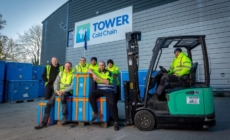-
Tower Launches Customer Sustainability Hub with Practical Tools for Lower-Impact Pharmaceutical Cold Chain - October 16, 2024
-
Six decision-making models for best practice WMS digital transformation - October 16, 2024
-
“Transforming Logistics: Precision and Purpose” – BIFA takes centre stage - October 15, 2024
-
JAMES JONES & SONS LTD EXPANDS ITS PALLETS & PACKAGING DIVISION THROUGH THE ACQUISITION OF HG TIMBER LTD - October 10, 2024
-
HUGO BECK EXPANDS MACHINE RANGE FOR E-COMMERCE, MAIL ORDER AND LOGISTICS - October 10, 2024
-
Winning Irish Exporter of the Year, Combilifts CEO Martin McVicar talks about the journey into the Global Market - October 8, 2024
-
JAMES JONES & SONS’ AUSTRALIAN SUBSIDIARY, HYNE GROUP, EXPANDS TO WESTERN AUSTRALIA - October 3, 2024
-
QUECLINK LAUNCHES SOLAR-POWERED ASSET TRACKER FOR TRAILERS AND CONTAINERS - October 3, 2024
-
Southgate Global Calls for Greater Health and Safety in the Warehouse Back Care Awareness Week - October 3, 2024
-
Nulogy to Expand Capabilities with Strategic Acquisition of Mingo Smart Factory - October 3, 2024
What’s the forecast?
Regular forecasting and planning meetings are one of the cornerstones of any successful relationship between a company and its fulfilment partner, says William Walker
For most businesses forecasting involves a degree of guesswork, but it is nevertheless an essential process – particularly when it comes to managing supply chains.
Quite simply, overestimating demand will result in bloated inventory and raised storage costs but, on the other hand, underestimate the market’s requirement and you run the risk of valued customers not getting the products they want when they want them.
So, regular forecasting and planning meetings are one of the cornerstones of any successful relationship between a retailer and its third party logistics (3PL) fulfilment partner.
As with so many aspects of the 3PL/client relationship, communication is key where all matters relating to forecasting and planning are concerned and it is vital that the 3PL is made aware of anything that is likely to lead to a spike in inbound or outbound orders at the earliest opportunity if optimum service levels and pre-agreed KPIs are to be maintained.
There are plenty of things – some of them seemingly trivial – that the retailer should always strive to flag up to its 3PL partner at regular planning meetings. For example, if a company operates in the B-2-B space, has it picked up any significant contracts recently that are likely to result in an upturn in demand for its products? Has the Distribution Centre changed how product must be prepared and sent to them? Are any marketing campaigns or other promotions planned that will drive B-2-C sales or new products set to be launched that may create extra demand?
Of course, if a retailer is going to be in a position to impart the kind of useful intelligence that its 3PL partner needs, it must first ensure that its own internal lines of communication are flowing openly. It is surprising how many companies – often the biggest firms – create their own supply chain planning problems by failing to communicate between departments or across regional operations.
For example, during last year’s Black Friday peak period one of Walker’s clients experienced an increase in online orders way in excess of what had been anticipated.
It transpired that the company’s global parent had held a ‘flash’ 40 per cent off everything internet promotion – but had failed to mention it to its subsidiaries!
For fresh start-up businesses that have experienced rapid growth, accurate forecasting can, of course, be a challenge, which is why Walker Logistics’ clients benefit from the input and guidance of an experienced personal account manager. They are on-hand every day to lend support where required and offer any relevant advice that they feel may be beneficial or assist the services provided.
The saying goes ‘failing to plan is planning to fail’ but for retailers and their logistics partners it might be adjusted to ‘failing to communicate your plan is planning to fail.’
William Walker is sales director of Walker Logistics Ltd.































